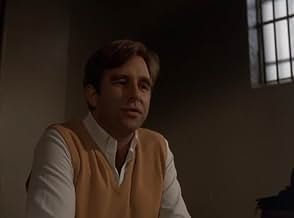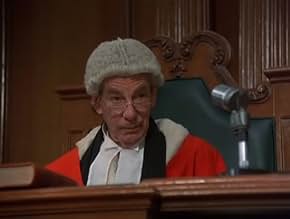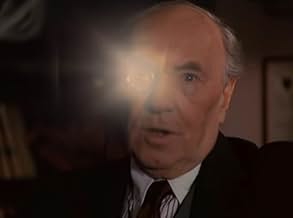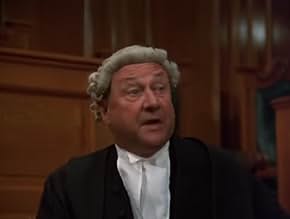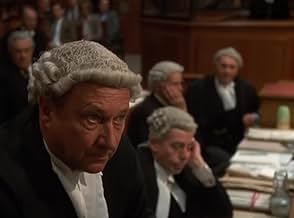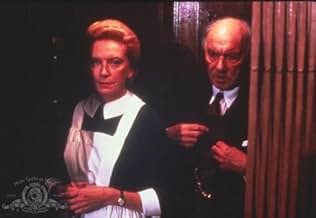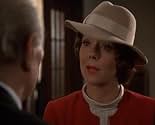VALUTAZIONE IMDb
7,1/10
1322
LA TUA VALUTAZIONE
Aggiungi una trama nella tua linguaLeonard Vole is accused of murdering an elderly rich woman, and the only alibi to him depends on his wife Christine.Leonard Vole is accused of murdering an elderly rich woman, and the only alibi to him depends on his wife Christine.Leonard Vole is accused of murdering an elderly rich woman, and the only alibi to him depends on his wife Christine.
- Regia
- Sceneggiatura
- Star
- Candidato a 1 Primetime Emmy
- 1 candidatura in totale
Ken Kitson
- Policeman
- (as Kit Kitson)
Recensioni in evidenza
In 1954, when the efficient but bitter and stubborn barrister Sir Wilfrid Robarts (Ralph Richardson) returns to his office in London recovering from a heart attack, he is invited to defend Leonard Stephen Vole (Beau Bridges), who is the prime suspect in a murder case. Leonard is a former soldier that fought in World War II and is married with his beloved German wife Christine Helm Vole (Diana Rigg). He is unemployed and accused of seducing and murdering the wealthy middle-aged single woman Emily French (Patricia Leslie) to inherit 80,000 pounds. His unique alibi would be the testimony of Christine, which would not be accepted by the court, since she is his wife. Along the trial, Christine is surprisingly called to testify in court by the prosecution, when secrets about their lives are disclosed.
"Witness for the Prosecution" (1957) is another remarkable movie of Billy Wilder and one of the best about trial. Based on the play of Agatha Christie, the plot is perfectly tied-up without any flaw in the screenplay, which has many plot points and witty lines in a perfect combination of the caustic and sarcastic "British humor" with crime, drama and mystery. Despite being a good remake with great cast and performances, I do not understand the purpose of shooting frame-by-frame the masterpiece of Billy Wilder. The last time I had seen this film was on 14 June 2003. My vote is seven.
Title (Brazil): "Testemunha de Acusação" ("Witness for the Prosecution")
"Witness for the Prosecution" (1957) is another remarkable movie of Billy Wilder and one of the best about trial. Based on the play of Agatha Christie, the plot is perfectly tied-up without any flaw in the screenplay, which has many plot points and witty lines in a perfect combination of the caustic and sarcastic "British humor" with crime, drama and mystery. Despite being a good remake with great cast and performances, I do not understand the purpose of shooting frame-by-frame the masterpiece of Billy Wilder. The last time I had seen this film was on 14 June 2003. My vote is seven.
Title (Brazil): "Testemunha de Acusação" ("Witness for the Prosecution")
In 1958 Billy Wilder made one of the best film adaptations of an Agatha Christie story when he directed WITNESS FOR THE PROSECUTION, with Charles Laughton, Marlene Dietrich, Tyrone Power, Elsa Lanchester, and Una O'Connor. It is one of those mystery films that, even when you understand the trick, does not fail to remain entertaining. But it has to be done in a certain way, with a sense of decorum and tradition (personified by Laughton as Sir Wilfred Robarts - brilliant defense barrister but guardian of England's precious laws and sense of justice). It is infectious. Even Power as the seemingly helpless Leonard Vole is desperately hoping that the system of justice will save him.
But along comes this version of 1982. One would have thought it could not fail with a star like Sir Ralph Richardson as Robarts and Diana Rigg as Christine Vole. But it does fail. Even with Dame Deborah Kerr as Nurse Plimsoll and Dame Wendy Hiller as Janet Mackenzie (the Una O'Connor role)it fails. Richardson is too laid back for Sir Wilfrid. When Rigg testifies against her husband, after having previously given him an alibi for the murder, Richardson almost seems to tease her about her behavior. In the same situation in the Wilder film, Laughton's justifiable anger at this turnabout leads to a peroration point where he shouts out that she is a perpetual liar. It was far more affective with Laughton, although Richardson was (traditionally) a greater actor.
Similarly, Tyrone Power's Leonard Vole was (as I said when reviewing the 1958 film version)playing Leonard for all the part is worth, and created the most sinister part he played after his best performance in NIGHTMARE ALLEY as Stanton Carlyle. The last ten minutes of the film show what a totally amoral and vicious louse Power's Vole really is. Beau Bridges was as laid back as Richardson, making the mistake of making Vole seem a nice guy. Vole can be helpless in the arms of the British judicial system or he can be a louse. He can't be a guy you want to take out for a fishing expedition.
I give this film a "6" - barely because the cast tried. Their ideas were wrong in Richardson and Bridges' interpretations.
But along comes this version of 1982. One would have thought it could not fail with a star like Sir Ralph Richardson as Robarts and Diana Rigg as Christine Vole. But it does fail. Even with Dame Deborah Kerr as Nurse Plimsoll and Dame Wendy Hiller as Janet Mackenzie (the Una O'Connor role)it fails. Richardson is too laid back for Sir Wilfrid. When Rigg testifies against her husband, after having previously given him an alibi for the murder, Richardson almost seems to tease her about her behavior. In the same situation in the Wilder film, Laughton's justifiable anger at this turnabout leads to a peroration point where he shouts out that she is a perpetual liar. It was far more affective with Laughton, although Richardson was (traditionally) a greater actor.
Similarly, Tyrone Power's Leonard Vole was (as I said when reviewing the 1958 film version)playing Leonard for all the part is worth, and created the most sinister part he played after his best performance in NIGHTMARE ALLEY as Stanton Carlyle. The last ten minutes of the film show what a totally amoral and vicious louse Power's Vole really is. Beau Bridges was as laid back as Richardson, making the mistake of making Vole seem a nice guy. Vole can be helpless in the arms of the British judicial system or he can be a louse. He can't be a guy you want to take out for a fishing expedition.
I give this film a "6" - barely because the cast tried. Their ideas were wrong in Richardson and Bridges' interpretations.
Sorry but I find the original a bit slow. The original court case is probably more dramatic. However, I like the cast better in this newer rendition and wish it was available on DVD. Diana Rigg as always is great. Deborah Kerr and Donald Pleasance also turn in good performances.
Everyone who has seen both versions will compare. Well, Charles Laughton and Tyrone Power in my opinion are better than Ralph Richardson and Beau Bridges. Charles Laughton simply is very funny. Tyrone Power performs a more shady character. But Diana Riggs is excellent, while Marlene Dietrich, much to my surprise and disappointment, is quite woody. The story in both versions are very alike. Though I haven't read the book, I assume they remain both quite close to it. So preference depends on the acting. I don't have one. I quite enjoyed both. The strength of the story is proved by the fact, that one can enjoy it even with knowing the real meaning of all the twists and turns.
This is Dame Agatha at her best. I also have the 1957 original, but I gotta tell you this version is far better! Credit Diana Rigg for that, she steals the show and gives a towering performance.
The film starts when Janet is on her way back to the house(Wendy Hiller)She hears two people-she sees one of them-but can't see the other-it's a man. She goes upstairs-then she hears screams and crashing about. She goes down stairs to find a middle aged woman dead.
That's the set up. What follows is a series of plot twists. Leonard Vole(Beau Bridges) Is arrested for the crime and is brought to trial. The Barrister Sir Wilford Robarts(Ralph Richardson)is asked to take the case.
Is Leonard Vole Guilty? Be prepared for one of the most surprising endings in a mystery! It's shot in the arm from Agatha Christie! Oh, Agatha How could you?
The film starts when Janet is on her way back to the house(Wendy Hiller)She hears two people-she sees one of them-but can't see the other-it's a man. She goes upstairs-then she hears screams and crashing about. She goes down stairs to find a middle aged woman dead.
That's the set up. What follows is a series of plot twists. Leonard Vole(Beau Bridges) Is arrested for the crime and is brought to trial. The Barrister Sir Wilford Robarts(Ralph Richardson)is asked to take the case.
Is Leonard Vole Guilty? Be prepared for one of the most surprising endings in a mystery! It's shot in the arm from Agatha Christie! Oh, Agatha How could you?
Lo sapevi?
- QuizThe 1957 version of this same material, starring Charles Laughton, Tyrone Power, Elsa Lanchester and Marlene Dietrich, directed and co-written by Billy Wilder, is widely considered a classic of the courtroom drama genre.
- BlooperIn the witness box, the maid Janet McKenzie states that September 14th 1954 was a Friday, which was her day off. That date was, in fact, a Tuesday.
- ConnessioniEdited into Hallmark Hall of Fame (1951)
I più visti
Accedi per valutare e creare un elenco di titoli salvati per ottenere consigli personalizzati
Dettagli
- Data di uscita
- Paesi di origine
- Lingua
- Celebre anche come
- Agatha Christie's Witness for the Prosecution
- Luoghi delle riprese
- Aziende produttrici
- Vedi altri crediti dell’azienda su IMDbPro
Contribuisci a questa pagina
Suggerisci una modifica o aggiungi i contenuti mancanti

